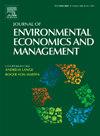Downstream carbon leakage from upstream carbon tariffs: Evidence from trade tariffs
IF 5.9
3区 经济学
Q1 BUSINESS
Journal of Environmental Economics and Management
Pub Date : 2025-08-21
DOI:10.1016/j.jeem.2025.103220
引用次数: 0
Abstract
Pricing the carbon content of imports, or carbon tariffs, is being considered as a solution to policy-induced carbon leakage. However, the unilateral implementation of carbon tariffs could have unintended consequences, such as further emissions reshuffling or costly trade retaliation. This is particularly the case as proposed carbon tariffs will target emissions from upstream products. This paper estimates how upstream carbon tariffs will affect carbon leakage by exploiting variation in export tariffs. Using a two-country model, I first show that an upstream carbon tariff can lead to emissions leakage down the supply chain. Empirically, I estimate the upstream and downstream foreign emissions effects of export tariffs using plausibly exogenous increases in export tariffs during the 2018–2019 trade war for US manufacturing facilities, while controlling for other tariff changes. While I find evidence that US greenhouse gas emitting facilities respond to export tariffs on their outputs by reducing their emissions, I also find evidence of increased emissions from downstream facilities through input–output linkages. In the case of the US manufacturing industries that faced export tariff increases during the trade war, emissions increases from input users could offset the emissions reductions from facilities in upstream targeted industries. Results in this paper highlight the importance of input–output linkages for the net emissions effect of incomplete carbon tariffs.
上游碳关税造成的下游碳泄漏:来自贸易关税的证据
对进口产品的碳含量进行定价或征收碳关税,被认为是解决政策导致的碳泄漏的一种方法。然而,单方面实施碳关税可能会产生意想不到的后果,例如进一步的排放重组或代价高昂的贸易报复。由于拟议中的碳关税将针对上游产品的排放,情况尤其如此。本文利用出口关税的变化来估计上游碳关税对碳泄漏的影响。利用两国模型,我首先证明了上游的碳关税会导致排放向供应链下游泄漏。从经验上看,我在控制其他关税变化的情况下,利用2018-2019年贸易战期间美国制造业出口关税貌似外生的增长,估计了出口关税对上游和下游外国排放的影响。虽然我发现有证据表明,美国温室气体排放设施通过减少排放来应对出口关税对其产出的影响,但我也发现有证据表明,下游设施通过投入产出联系增加了排放。以贸易战期间面临出口关税上调的美国制造业为例,投入用户的排放增加可以抵消上游目标行业设施的排放减少。本文的结果强调了投入产出联系对不完全碳关税净排放效应的重要性。
本文章由计算机程序翻译,如有差异,请以英文原文为准。
求助全文
约1分钟内获得全文
求助全文
来源期刊
CiteScore
8.00
自引率
4.30%
发文量
91
期刊介绍:
The Journal of Environmental Economics and Management publishes theoretical and empirical papers devoted to specific natural resources and environmental issues. For consideration, papers should (1) contain a substantial element embodying the linkage between economic systems and environmental and natural resources systems or (2) be of substantial importance in understanding the management and/or social control of the economy in its relations with the natural environment. Although the general orientation of the journal is toward economics, interdisciplinary papers by researchers in other fields of interest to resource and environmental economists will be welcomed.

 求助内容:
求助内容: 应助结果提醒方式:
应助结果提醒方式:


